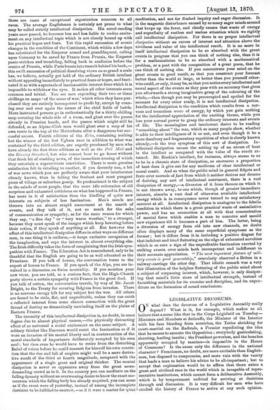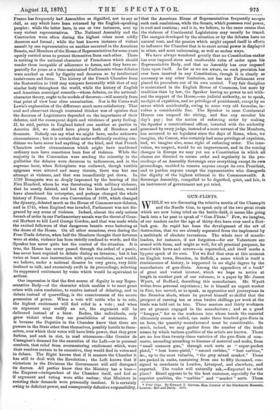LEGISLATIVE DECORUMS.
ON what does the decorum of a Legislative Assembly really depend? What is it, for example, which makes us all believe that a scene like that in the Corps Legislatif on Tuesday— Ministers and Members at fisticuffs, the Minister of the Interior with his face bleeding from scratches, the Tories shrieking for court-martial on the Radicals, a Premier repudiating the idea that he means to execute the Opposition ; everybody gesticulating, shouting, hurling insults ; the President powerless, and the benches apparently occupied by maniacs—is impossible in the House of Commons? Is the cause only the difference in the national character ? Frenchmen, no doubt, are more excitable than English- men, less disposed to compromise, and more vain with the vanity that leads a man to believe his advice to be all-important ; bat to accept that explanation would be to affirm that there exists a great and civilized race in the world which is incapable of repre- sentative institutions, which cannot form a deliberative Assembly, which is by temperament unfitted for arriving at decisions through oral discussion. It is very difficult for men who have studied the history of France to arrive at any such opinion.
France has frequently had Assemblies as dignified, not to say as dull, as any which have been returned by the English-speaking peoples; while the latter have, in one or two instances, sent up very violent representatives. The National Assembly and the Convention were often during the highest crises most coldly decorous and formal ; while the best known instance of violent assault by one representative on another occurred in the American Senate, and Members of the House of Representatives for some years -openly carried arms to protect themselves from each other. There is nothing in the national character of Frenchmen which should render them incapable of adherence to forms, and they have re- peatedly for years at a time maintained Parliaments whose debates were marked as well by dignity and decorum as by intellectual incisiveness and force. The history of the French Chamber from the Restoration to 1848 may compare favourably with that of any similar body throughout the world, while the history of English and American municipal councils—whose debates, on the national- -character theory, ought to be models of decorum—will scarcely from that point of view bear close examination. Nor is Sir Corm wall Lewis's explanation of the difference much more satisfactory. That -cool and observant though overrated thinker was of opinion that the decorum of Legislatures depended on the importance of their -debates, and the consequent depth and virulence of party feeling. If, he said, parties in England hated one another as parties in America did, we should have plenty both of Brookses and Sumners. Nobody can say what we might have, under unknown .circumstances; but it is certain that under sufficiently exciting con- ditions we have never had anything of the kind, and that French -Chambers under circumstances which might have maddened ordinary men have sometimes been free of violence. While the majority in the Convention were sending the minority to the guillotine the debates were decorous to tediousness, and in the supreme hour, when Robespierre was outlawed, though terrible --epigrams were uttered and many threats, there was but one -attempt at violence, and that was immediately put down. In 1799 Bonaparte was so deeply impressed by the bearing of the Five Hundred, whom he was threatening with military violence, that he nearly fainted, and but for his brother Lucien, would 'have abandoned his enterprise, and perhaps changed the whole dilatory of France. Our own Convention of 1688, which changed -the dynasty, debated much as the House of Commons now debates, and in 1745, when England was invaded, Parliament was not dis- graced by any scene of violence. Indeed, almost the only serious breach of order in our Parliamentary annals was the threat of Gene- ral Herbert to kill Lord George Gordon, and that was made while -the excited followers of that dangerous lunatic were battering at the doors of the House. On all other occasions, even during the Free-Trade debates, when half the Members thought their fortunes -were at stake, violence has been strictly confined to words, and the Speaker has never quite lost the control of the situation. It is true, the House has never passed through the ordeal of a panic, has never been required to debate during an invasion ; but it has twice at least met insurrection with quiet resolution, and would, -we believe, under a national disaster be very grave, very little inclined to talk, and excessively swift in its proceedings, relieving its suppressed excitement by votes which would be equivalent to -actions.
Our impression is that the first source of dignity in any Repre- -sentative Body—of the character which enables it to meet great .crises with calm resolution, to resolve instead of debating, and to debate instead of quarrelling, is the consciousness of the secure possession of power. When a vote will settle who is to rule, the highest excitement will find relief in a vote ; and when an argument may modify an act, the argument will be -delivered instead of a blow. Bodies, like individuals, only grow violent when they see possibilities of resistance. It is because the Deputies in the Chamber know that there are powers in the State other than themselves, possibly hostile to them- selves, over which their votes will have little power, that they grow furious, and seek in riot, in mad utterances—like Granier de Cassagnac's demand for the execution of the Left—or in personal -combats, that relief from overmastering excitement which, were their resolves certain to be executive, they would find in votes and in debate. The Right knows that if it masters the Chamber it -has still to deal with the Revolution ; the Left knows that if victorious in the Divisions the Government will still disregard its decrees. All parties know that the Ministry has a base— the Emperor—independent of the Chamber itself, and feel as -if argument and voting were alike useless ; that Ministers in resisting their demands were personally insolent. It is certainly owing to deficient power, and consequently defective responsibility,
that the American House of Representatives frequently accepts such rash resolutions, while the Senate, which possesses real power, is cool and cautious; and it is, we believe, to the same causes that the violence of Continental Legislatures may tonally be traced. The energies developed by the situation or by the debates have no natural vent, and the passion which might expend itself in efforts to influence the Chamber that is to exert actual power is displayed in other, and most unbecoming, as well as useless ways.
We have always wondered greatly that no Constitution-maker has ever imposed stern and unalterable rules of order upon his Representative Body, and that no Assembly has ever imposed them upon itself. As far as we are aware, no such provision has ever been inserted in any Constitution, though it is clearly as necessary as any other limitation, nor has any Parliament ever placed its procedure out of its own control. Very fair discipline is maintained in the English House of Commons, but more by tradition than by law, the Speaker having no power to act with- out the support of the House,—no judicial authority, so to speak, no right of expulsion, and no privilege of punishment, except by an arrest which accidentally, owing to some very old formulas, in- volves a considerable fine. The Speaker in most Continental Houses can suspend the sitting, and fine any member his day's pay ; but the notion of enforcing order by making the Speaker a constitutional officer, invested with the authority possessed by every judge, instead of a mere servant of the Members, has occurred to no legislator since the days of Rome, when, we imagine, the Censor, who certainly had some privilege of expulsion, had, we imagine also, some right of enforcing order. The inno- vation, we suspect, would be an improvement, and in the coming changes in Europe we may yet see a Constitution in which all clauses are directed to secure order and regularity in the pro- ceedings of an Assembly Sovereign over everything except its own proceedings, enabled to remove anyone except its own President, and to pardon anyone except the representative who disregards the dignity of the highest tribunal in the Commonwealth. A Sovereign Assembly, compelled to be dignified, quiet, and fair, is an instrument of government not yet tried.































 Previous page
Previous page